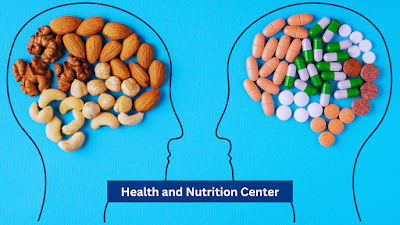Brain Health
Our brains are the complex control systems that coordinate every aspect of our existence, directing everything from our memories and actions to our thoughts and feelings. To operate at peak efficiency, the brain needs the best fuel, just like any other high-performance equipment. This is where "brain-boosting foods" and the interesting domain of "brain health" come into play, providing a tasty route to improved cognitive function.
Understanding Brain Health:
The term "brain health" refers to a wide range of conditions, including mood, memory, cognitive performance, and resistance to neurodegenerative illnesses including dementia and Alzheimer's. Age-related changes are unavoidable, but how quickly and how severely they occur can be greatly influenced by our food and other lifestyle decisions.
The Power of Food:
Food is a symphony of vital elements that sustain our complete body, including the intellect, and serves as more than just nourishment. Some dietary categories are particularly strong sources of particular neurotransmitters:
Omega-3 Fatty Acids: Found in fatty fish such as mackerel, salmon, and tuna, these fats boost learning, memory, and attention in the brain by acting as conductors. Consider them as the tune that maintains harmony in your mind.
Antioxidants: Found in abundance in vibrant fruits and vegetables, antioxidants protect brain cells from injury by finding dangerous free radicals like brave knights. Nuts, berries, and leafy greens are antioxidant powerhouses that protect your brain from possible damage.
Choline: This vitamin is essential for memory and learning; it functions as the brain's sheet music. Rich sources include liver, some beans, and egg yolks, which help to keep your cognitive processes in harmony.
Vitamin B12: Like a conductor's baton, it ensures fluid communication between brain cells and is crucial for nerve function and cognitive functioning. Fortified meals and animal products are excellent sources that help maintain the harmony of your brain's symphony.
Flavonoids: Found in citrus fruits, tea, and chocolate, these substances improve blood flow to the brain and boost cognitive performance. Think of them as the dynamic percussionists. They give the functioning of your brain a lively rhythm.
Building a Brain-Healthy Diet:
Although there are many advantages associated with particular meals, real intelligence is found in a varied and well-balanced diet, much as in a practiced symphony. Remember these important points:
Focus on whole foods: Give priority to entire grains, fruits, vegetables, lean meats, and healthy fats. Compared to processed meals, which are like off-key notes in the composition of your brain, they offer a greater diversity of nutrients.
Limit saturated and trans fats: They impair blood flow and may have detrimental effects on brain function. Consider them as startling, harsh noises that throw off the harmony. Choose healthy fats with a smoother, more supporting role, such as avocado and olive oil.
Reduce added sugar and refined carbohydrates: These aggravate inflammation and impair brain function. Think of them as disorganized, discordant chords that upset the beat of your brain. For a more sustainable and well-balanced symphony, use whole grains and natural sweeteners.
Keep Hydrated: All body processes, including brain function, depend on water. Eight glasses of water a day is the goal. Imagine it as the constant pounding that maintains your brain operating at its best.
Expanding the Symphony: Going Beyond the Plate
Although diet is still the basis of health, other lifestyle choices are as important and function as extra instruments in your brain's orchestra:
Frequent Exercise: Exercise improves cerebral blood flow, which supports neuron development and cognitive performance. Make sure to fit in about 30 minutes of moderate-intensity exercise on most days of the week. Think of it as a fast-paced, energizing beat that maintains your brain's energy levels elevated.
Good Sleep: Lack of sleep hurts attention, memory, and learning. Aim for seven to eight hours of good sleep every night. Consider it a calming lullaby that helps your brain recover and organize knowledge.
Control Stress, the Calm Counterpoint: Prolonged stress can lead to cellular damage in the brain. Meditation and yoga are examples of mindfulness exercises that can reduce stress and enhance brain function. Think of them as soothing counterpoints that restore balance to the music of your brain.
Creative Flexible Thinking: Test your mental faculties by solving puzzles, picking up new abilities, and engaging in brain games. These mental exercises maintain your flexibility and sharpness, much like entertaining variations.
Keep in mind:
Consistency is essential. Over time, tiny, sustained adjustments to your food and way of life can have a big influence on the health of your brain. Pay attention to your body, eat meals that support your needs, and do mental-stimulating activities. Take small, deliberate steps towards a healthier, sharper brain one tasty mouthful at a time.







0 Comments
Please do not enter any spam links in the comment box.